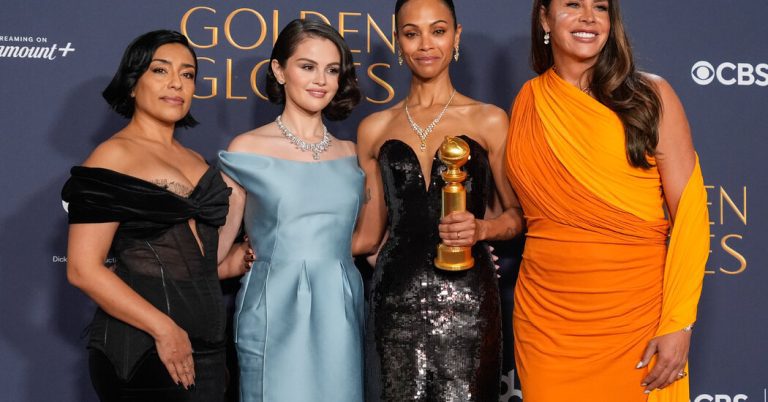Hollywood raised a white flag in the culture war on Sunday.
This summary of the 82nd edition of the Golden Globe Awards will undoubtedly infuriate some people in the cinema capital. We? Conceding moral superiority to President-elect Donald J. Trump and his supporters? Never.
They could name – rightly – the films that won awards on Sunday. “Emilia Perez,” winner of four Globes, is a Spanish-language musical about trans identity. “The Brutalist,” which received three, is an epic about the struggles of immigrants. “Wicked”, which received the new award for best blockbuster, talks about prejudice and the corruption of power.
But the Globes have never been about subtlety. The Globes are where stars are supposed to let loose, where they proselytize for progressive causes and concerns. Sunday’s broadcast was Hollywood’s first megaphone since Mr. Trump was comfortably elected to a second term. And this time there was almost no sound.
In 2017, Meryl Streep ripped into Mr. Trump from the Globes stage, firmly throw down the gauntlet for a new type of culture war. The following year, the Globes became a de facto rally for the Time’s Up movement, with dozens of actresses wearing black to protest sexual harassment and Oprah Winfrey delivering a searing speech. In 2020, Michelle Williams made a passionate plea for abortion rights, while Russell Crowe drew attention to climate change and Australia’s bushfire crisis.
Black Lives Matter, the global refugee crisis and veganism have all been touted from the Globes stage. In 2023, the Globes gave airtime to the Ukrainian president, Volodymyr Zelenskywho gave a speech condemning Russia.
At the official red carpet pre-show, the hosts kept up a cotton candy-like conversation: You’re beautiful, I’m beautiful, the weather is beautiful, everything is beautiful. “It’s Sunday afternoon and the sun is out,” Felicity Jones told an interviewer. “There’s not much to complain about.”
During her monologue that opened the show, comedian Nikki Glaser gently teased the assembled celebrities for failing to stop Mr. Trump from returning to office. “It’s okay,” she said. “You’ll get them next time, if there ever is one.” She smiled and added, “I’m scared,” before changing the subject to Ben Affleck’s sex life.
The only other notable political commentary came three hours later, when “Emilia Pérez” won the Globe for best musical or comedy. The film’s star, Karla Sofía Gascón, took the opportunity to speak out in support of trans rights. “You can beat us,” she said. “But you can never take our soul away.”
“Raise your voice,” she added.
Perhaps the lack of politics on Sunday’s show shouldn’t be so surprising. Many of those who oppose Mr. Trump still seem to be figuring out how to respond to him and his administration. And there has even been a slight shift to the right on the part of Hollywood, to erase some of the more progressive aspects of some shows and select more films that speak to Mr. Trump’s base.
Before the Globes, some publicists and agents advised their clients to stay silent about Mr. Trump and cited Rachel Zegler as an example of a caution. After the November election, Ms. Zegler, the young star of Disney’s upcoming action film “Snow White,” harshly decried Mr. Trump and his supporters in a social media post. The MAGA blowback has been severe, and Ms. Zegler has been obliged to apologize.
And for the people behind the Globes, the silence was probably welcome. Producers specializing in awards broadcasts say research, compiled primarily by Nielsen, indicates that viewers don’t like it when celebrities turn their time on stage into political bully pulpits. Minute-by-minute audience analysis indicates that “vast swaths” of people turn off the television when celebrities start giving their opinions on politics.
It’s reminiscent of a time decades ago when stars strove to be stars, relying on charm and saying nothing that would alienate a single ticket buyer. The message came through loud and clear.


